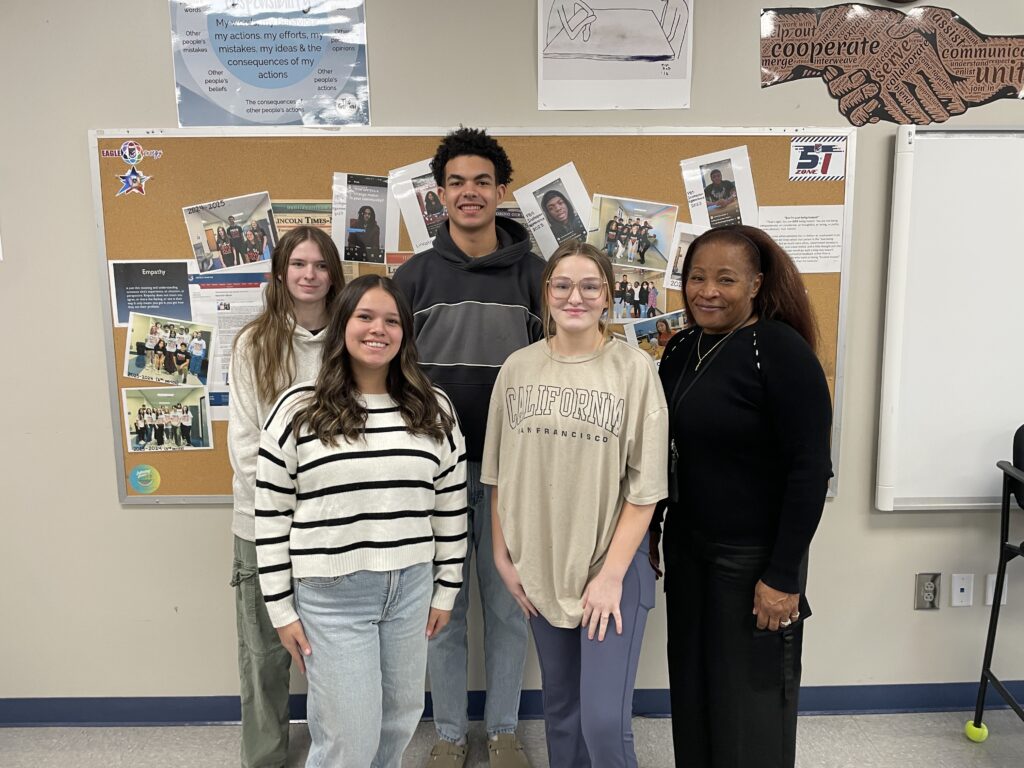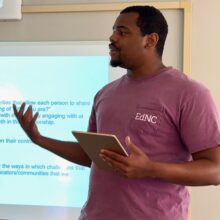For the past six years, Dr. Roberta Callaway has been a high school English teacher at Lincoln Charter in Lincoln County. Prior to relocating to North Carolina, she spent over a decade teaching in Virginia.
Before making the transition to teaching, Callaway was responsible for “bringing the world to the sea.” As a veteran of the United States Navy, she continues to integrate her communications and journalism experience from the military into the classroom.
Accepting the challenge
When she first enlisted in the military in 1976, Callaway didn’t foresee having a 20+ year career.
“I just wasn’t sure I wanted to be in the military,” she stated. Yet, after becoming familiar with the different opportunities available, she ventured into broadcast engineering.
According to Callaway, at that time, no female had graduated from the closed circuit television school. Thus, despite not knowing exactly what was to come, she accepted the challenge.
“I just wanted to see if I could be the first female to graduate close circuit school,” she expressed.
Admittedly, Callaway’s eventual success in the school came with obstacles. She specifically communicated her gratitude for a classmate who simplified currents and circuits by drawing comparisons to neighborhoods. Once she was able to be hands-on with the equipment, a switch flipped, allowing many of her classmates’ explanations to come to light — “it made sense,” she said.
Upon graduating, she was offered the opportunity to continue into the broadcast maintenance school in Denver, CO.
In all, Callaway’s educational pursuit transformed what she initially thought would be a two-year phase in the military into a long-term career. Up until she left the Navy in 1999, she spent a tremendous amount of time at sea and abroad.
At the time, U.S. news would be taped and airlifted to the ship at sea. Part of Callaway’s responsibility was to disseminate the information. Her role consisted of handling the maintenance of the entire closed circuit system on the ship, managing repairs, setting up satellites when reaching ports, and many other tasks for maintaining communications.
Additionally, for four years of her time in the Navy, Callaway worked for a TV station located in Sicily. As part of that role, she handled a multitude of things behind the scenes, such as hair and makeup, lighting, camera cues, and much more.
Ultimately, these experiences all served as the foundation for the passion that Callaway has found in teaching students about communications, journalism, and documentaries.

Making the transition
At the age of 40, Callaway entered post-military life. Though unsure of what she would commit her time to, she lightheartedly said, “I wasn’t going to spend the whole rest of my life waiting to die.”
As a Virginia Beach resident, Callaway spent her initial years going to the beach daily, in the gym frequently, and indulging in all of the things that she thought she was missing. Yet, eventually, going to the beach became tiresome, and Callaway said her “house was about as clean as it could possibly be.”
Thus, after five years, she began her pursuit for her next career. An aptitude test offered by the military identified counseling and teaching as two of her strongest areas. She explored both.
Callaway went on to acquire her bachelor’s degree in counseling at Old Dominion University. While there, she completed an internship at a shelter for women who were victims of abuse. Despite feeling like she was able to make a difference helping women get on their feet, Callaway ultimately decided to pivot after experiencing the emotional toll of witnessing a client reunite with their abuser.
Thus, teaching became Callaway’s priority. As she continued her education, having received her first master’s in education, she discovered her love for teaching.
“I love the ability, the responsibility, and the importance of being able to have an effect on the lives of future citizens,” Callaway expressed.
In her first teaching position, Callaway ran a reading program serving students who had been held back multiple years. After recognizing her areas for improvement in order to better serve students, Callaway attained a second master’s degree in reading, in addition to receiving a certification as a K-12 reading specialist.
As a result, Callaway spent 11 years teaching reading at Lake Taylor High School in Virginia. Over the years, she delved into different strategies for creating gateways for students’ interest in reading, such as introducing unsolved crimes and other non-fiction material.
While Callaway acknowledged that she may not have had a 100% success rate, she’s been fortunate to see the fruits of her labor via the plethora of students who have reached out post-graduation to offer thanks. It is these moments that have reaffirmed Callaway’s commitment and love for teaching.
Bringing experiences into the classroom
In recent years, since joining the staff at Lincoln Charter, Callaway has embraced the opportunity to revisit the skills she acquired during her time of Navy broadcasting. As an English teacher, she has integrated communications and media into her classroom.
Callaway established a PBS student reporting lab at the school. Over time, this collaboration has consisted of students being in relationship with PBS to offer their perspective on various topics. In addition, students have had access to a producer with the opportunity to pitch their own stories.
For the 2024-25 academic year, Callaway’s students participated in the C-SPAN Student Cam 21st annual student documentary competition. With the theme of “Your Message to the President,” students from across the country developed documentaries focused on important issues in their respective communities.
This presented Callaway’s class with the opportunity to apply skills they previously learned, such as interviewing, lighting, audio, and overall putting together a comprehensive story.
Callaway shared that the competition required students to exemplify autonomy over their own learning while applying skills they’ve learned to real-life situations. Furthermore, she believes that projects like this push her students to engage in civil conversation, in some cases with people who have opposing views, which aids students in developing a well-rounded perspective.
“This was the first time I ever had the opportunity to just honestly stand back and let students learn on their own, ask questions, find their own answers to those questions, and be able to use that knowledge to produce something that they could have for the competition, but also a message to the world,” Callaway said.
When reflecting on his experience in Callaway’s class, Lincoln Charter senior Sylas Coleman highlighted how much they’ve learned about doing research, particularly as a means to not being led astray by misinformation on social media.
“We can go and fact check ourselves now, because we know to,” he said.
When speaking about the C-SPAN project specifically, junior Sophia Perez stated that it reaffirmed for her that in the world outside of school, everything won’t be handed to them.
“You’re gonna need to find little bits and pieces, put it together, and make one big thing for yourself,” she concluded.
More veterans in the classroom
Callaway believes that her time in the military allowed her to be well suited for leading in the classroom.
“I have a lot more patience with differences,” she said. “I met people in the military that, had I not joined the military, I don’t think I would ever know or understand their perspective.”
Regarding teaching, Callaway emphasized that “all students are different.” She believes her time in the military equipped her with both an open mind and desire for growth that allow her to embrace the differences her students bring to the table.
Callaway stated that students can benefit from the experience and knowledge gained from being in the military.
“I would like to see more veterans go into teaching because I think students need to understand that there are different facets to the world or the universe or their existence. You know, there’s so many different things that they can learn from so many different people,” she said.





